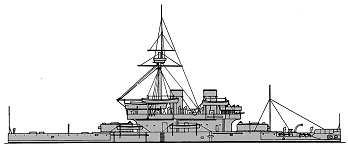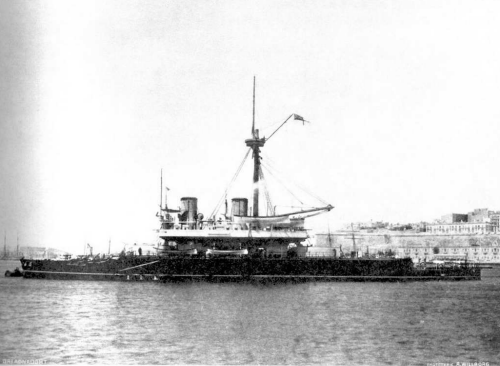

Dreadnought 1879
|
Name |
No |
Yard No |
Builder |
Laid down |
Launched |
Comp |
Fate |
| Dreadnought (ex-Fury) | 188 | Pembroke DYd | 10.9.1870 | 8.3.1875 | 15.2.1879 | sold 7.1908 |
Displacement normal, t |
10886 |
Displacement full, t |
|
Length, m |
97.5 pp 104.6 oa |
Breadth, m |
19.5 |
Draught, m |
8.08 |
No of shafts |
2 |
Machinery |
2 2-cyl VC, 12 cylindrical boilers |
Power, h. p. |
8206 |
Max speed, kts |
14.5 |
Fuel, t |
coal 1800 |
|
Endurance, nm(kts) |
5700(10) |
|
Armour, mm |
iron; belt: 356 - 203 with 457 - 381 mm wood backing, bulkheads: 279, citadel: 356 - 279, turrets: 356, decks: 76 - 64, CT: 356 - 152 |
Armament |
2 x 2 - 318/16 MLR Mk I, 2 - 356 TT (beam) |
Complement |
369 |
Project history: Enlarged Devastation laid down under the 1870 Estimates with more powerful machinery and fully armoured bow. Construction was suspended in 1871 pending the deliberations of the Committee on Designs and as result of its recommendations was redesigned to incorporate improved protection, armament and stability. Alterations included replacing the armoured breastwork with 56m central citadel extending the full width of the ship. The upper deck was continued fore and aft of the citadel as an unarmoured structure to raise freeboard and improve sea-keeping and speed in heavy weather.
Calibre of guns was increased from 305mm to 318mm and power training, elevation and loading were provided. Compound engines replaced the horizontal machinery specified in the original design, providing a 0.5kts increase in speed. She was the first ship to have a longitudinal middle-line bulkhead which extended for the majority of her length.
Dreadnought was a very successful ship and, unlike her half sisters, was a popular ship. A steady gun platform, she rolled little and was more capable of maintaining speed in a seaway than Devastation but was wetter and pitched more heavily.
Ship was laid down as Fury but renamed 1.12.1875.
Ship protection: 56m central citadel had 356-279mm armour on the sides, 330mm curved bulkheads and 76mm deck over. Below this the 2.6m deep belt was increased in thickness to 356mm amidships, tapering to 203mm at the lower edge and reducing to 203mm at the ends, with 64mm deck over beyond the citadel. The fore end of the belt was extended downwards to support the ram, obviating the need for a forward magazine bulkheads. The after bulkhead was retained. The turrets had 356mm armour in two thicknesses of 178mm each with wood backing.
Modernizations: 1884: + 10 x 1 - 11.4/87
1894: - 10 MGs; + 6 x 1 - 57/40 6pdr Hotchkiss Mk I, 10 x 1 - 47/40 3pdr Hotchkiss Mk I
1898: re-boilered, funnels were raised
Naval service: Dreadnought served as coastguard vessel since 1894. She was reclassified as 2nd class battleship in 1900, reduced to harbour service in 1902, laid up to reserve in 1905.
Thanks to Wolfgang Stöhr for additional information on this page.

Dreadnought as completed
© Ivan Gogin, 2008-14